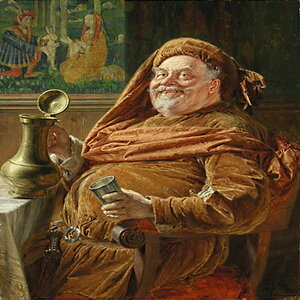
Sir John Falstaff
CBUB Wins: 1
CBUB Losses: 1
CBUB Ties: 0
Win Percentage: 50.00%
Added by: Z451
Read more about Sir John Falstaff at: Wikipedia
Official Site: Public Domain
Sir John Falstaff is a fictional character who appears in three plays by William Shakespeare and is eulogized in a fourth. His significance as a fully developed character is primarily formed in the plays Henry IV, Part 1 and Part 2, where he is a companion to Prince Hal, the future King Henry V of England. A notable eulogy for Falstaff is presented in Act II, Scene III of Henry V, where Falstaff does not appear as a character on stage, as enacted by Mistress Quickly in terms that some scholars have ascribed to Plato's description of the death of Socrates after drinking hemlock. By comparison, Falstaff is presented as the buffoonish suitor of two married women in The Merry Wives of Windsor.
Though primarily a comic figure, Falstaff embodies a depth common to Shakespeare's major characters. A fat, vain, and boastful knight, he spends most of his time drinking at the Boar's Head Inn with petty criminals, living on stolen or borrowed money. Falstaff leads the apparently wayward Prince Hal into trouble, and is ultimately repudiated after Hal becomes king. Falstaff has since appeared in other media, notably in operas by Giuseppe Verdi, Ralph Vaughan Williams, and Otto Nicolai, and in Orson Welles' 1966 film Chimes at Midnight. The operas focus on his role in The Merry Wives of Windsor, while the film adapts from the Henriad and The Merry Wives. Welles, who played Falstaff in his film, considered the character to be "Shakespeare's greatest creation".
Falstaff appears in three of Shakespeare's plays: Henry IV, Part 1, Henry IV, Part 2, and The Merry Wives of Windsor. His death is mentioned in Henry V but he has no lines, nor is it directed that he appear on stage. However, many stage and film adaptations have seen it necessary to include Falstaff for the insight he provides into King Henry V's character. The most notable examples in cinema are Laurence Olivier's 1944 version and Kenneth Branagh's 1989 film, both of which draw additional material from the Henry IV plays.
The character is known to have been very popular with audiences at the time, and for many years afterwards. According to Leonard Digges, writing shortly after Shakespeare's death, while many plays could not get good audiences, "let but Falstaff come, Hal, Poins, the rest, you scarce shall have a room".
CBUB Match Record:
No Regular Play Records Available
Fantasy Teams Season 11 Record:
View the historical team line-up
| Result | Opponent | My Score | Their Score | |
|---|---|---|---|---|
| Loss | Isla Nublar | 2 | to | 10 |
| Win | Vice City | 10 | to | 2 |
